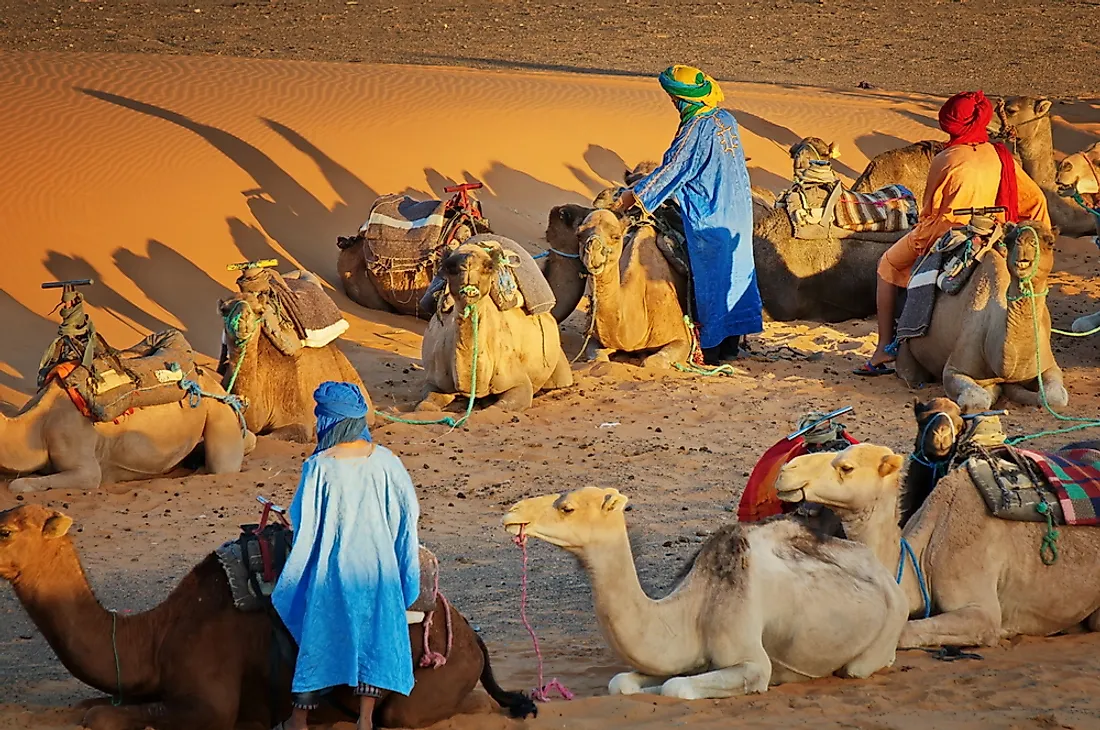The Ethnic Groups In Morocco

The Arab and Berber cultures can be traced back through several centuries in the nation's history, and they largely define what are now considered the "Moroccan" ways of daily life. The Berbers are the indigenous residents of Morocco. The Arab people came in the 7th Century and conquered the country. As a result, they infiltrated every sector of the Country and controlled the political, cultural, and social way of life of the Moroccans. Today, Arabs and Berbers closely intermingle, and bilingualism is a common characteristic in modern Morocco. The Jewish community played a significant role in the economic life of Morocco until their numbers started to dwindle. Other groups in Morocco are the Europeans, Sub-Sahara African, and Gnawa.
Historic Settlement of Morocco
Indigenous Berbers lived in Morocco more than two millennia before Phoenicians colonized the country in the 8th through 6th Centuries BC. Before the 3rd Century BC, Carthage ruled the coastal areas while indigenous monarchs ruled the hinterland. In 40 AD, the Roman Empire annexed part of what is present Morocco. In the mid-5th Century AD, the Vandals overrun the country until the 6th Century when the Byzantine Empire took over.In the last phase of the 7th Century, Muslims invasion of Morocco began. In the 8th Century AD, Arabs conquered the country and the Umayyad Caliphate ruled Morocco. The Arabs imposed their will on the towns, which then grew under their patronage, and so did the farming areas. The sedentary Berbers joined the Arabs looking for protection against their nomadic kins. During the Berber revolution of 740, the country broke away from the tyranny of Baghdad Caliphates after the Abbasids replaced the Umayyad Caliphate. However, half a century later the Idrisid dynasty established the Moroccan State. When Idris son and heir died, Morocco dissolved into inconsequential principalities. Tangier, the last territory was captured by the state of Cordovan in 929. From 1549 to 1659 the Saadi dynasties invaded and ruled Morocco. The Alaouites, the ruling dynasty of Morocco took power in 1667. The European settled in Morocco in early 1900s. By 1912-1956, Morocco was colonized by both French and Spanish administrations. The Arabs were most influential in the cultural aspects and the demographics of the country.
Arabs
The Arabs came to Morocco towards the end of the 7th Century, doing so in the name of Allah and spreading Islamic teachings. The Arabs had swept the Middle East and North Africa, spreading religion when they came to Morocco. Upon settling, they assimilated the Berbers community who were formerly Christians and converted them to Muslims. In the war of Iberian Peninsula, the Arabs and Berbers fought as Muslims. Today, most Moroccans identify as both Arabic and Berbers. Only a few Arabs, especially the Shereefs, who trace their ancestry back to Mohammed, the Prophet, claim to be pure Arabs.
Berbers
The Berbers are the native peoples of Morocco. They have lived in Morocco for more than four millenniums. They call themselves Amazigh and for centuries they fought against the Roman, Arab, and French invaders. The Berber language is more oral than written even though scripts as old as 2500 years old containing their writing system is available. Before the Arab invasion, the Berbers were Christian or Jewish. When the Arabs settled in Morocco, they converted to Islam.
Gnawa
The Gnawa people came from what was in ancient times the Ghana Empire of Ouagadougou, which ruled over present day Senegal, Mauritania, Burkina Faso, Gambia, and 85% of Mali. The ethnic community became part of Sufi order in Maghreb, present day Morocco. They adopted Islam but continued to practice possession, a type of dance, during rituals. The music of Gnawa mixes classical Islamic Sufism with the pre-Islamic African traditions. In Morocco culture, the Gnawa are considered experts in the treatment of psychological disorders, scorpion stings, the use of colors, perfumes, fright, and condensed cultural image.
Europeans
Europeans, also known as White Moroccans, are Moroccans with a European descent, most commonly descended from Spanish pr French ancestry. The Europeans settled in Morocco during the French and Spanish rule around 1912-1956. Before independence, more than half a million Europeans lived in Morocco. European population was almost half of the Casablanca’s total population. After the country's independence in 1956, the people of Europe dwindled. Today Europeans make only 1% of the total population.
Jews
After the destruction of the First Temple in Jerusalem, many Jews migrated to Morocco and settled among the Berbers. More Jews came to Morocco before and after the 1492 Alhambra Decree. This second wave of immigrants profoundly influenced the Moroccan Jewry, and soon they embraced the Andalusian Sephardic liturgy, and the Moroccan Jews started to identify with Sephardic. By the 1940s, the Jewish exceeded 250,000, but the Operation Yachin has reduced this population to around 5,000. From that period many of Moroccan Jews immigrated to Israel.
Sub-Saharan Africans
People from the Sub-Saharan African region have been migrating into Morocco since antiquity. During the slave trade, Morocco position along the coastline became a hub for Arab traders. Also, there is a possibility that some were escaping drought and famine in the Sahel region when they came to Morocco.Today, the country's proxy to the European countries attracts many Sub-Saharan Africans looking forward to crossing over. However, the strict immigration bans trap many people in Morocco. The majority of Sub-Saharan Africans in Morocco are from South Africa approximately 2,100 and Cote d'Ivoire with 1, 800.
Relations Among Ethnic Groups in Morocco
Since most of Moroccans are Muslims, most of these people can interact and relate to each other as fellow Muslims.There is generally a peaceful coexistence among the Muslim communities regardless of ethnic background. However, there have been cases of discrimination against the Black African community living in Morocco. Peoples from south of the Sahel region are often regarded as lesser communities. However, in more recent years, the government of Morocco has decided to provide these Sub-Saharan Africans living in Morocco more extensive citizenship rights.











